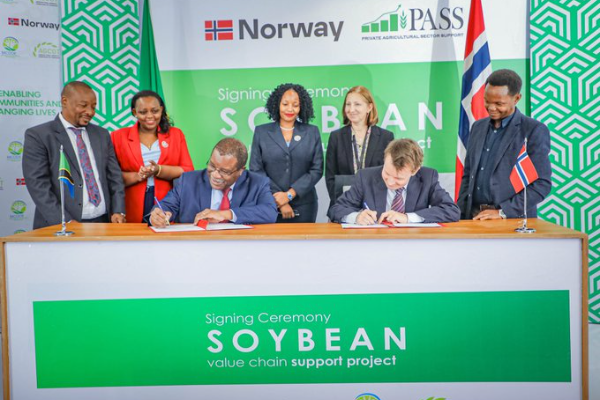The governments of Norway and Tanzania have joined forces to accelerate transformation of Tanzania’s soybean industry, with a new agreement worth USD 4.8 million signed between the Private Agricultural Sector Support (PASS) Trust and the Royal Norwegian Embassy, Dar es Salaam.
The partnership is designed to benefit an estimated 21,000 smallholder farmers across Tanzania, working to boost productivity, improve access to markets, substitute soybean imports, and create jobs.
According to the project outline, the three-year scheme will support the soybean value chain from seed to market, foster processing, and strengthen linkages between farmers, cooperatives, and agribusinesses.
“We are pleased to sign an agreement with Private Agricultural Sector Support (PASS) Trust to launch the USD 2.4 M Soybean Value Chain Support,” said Tone Tinnes, Norway’s Ambassador to Tanzania in a social-media post.
This forms part of a $4.8 million commodity compact financing initiative—combining a $2.4 million Norwegian grant with an equivalent PASS Trust guarantee mechanism to unlock commercial lending for smallholder farmers.
The agreement comes amid growing global demand for protein-rich crops, as well as increased interest from African governments in leveraging soybean production for nutritional security and industrial uses.
Tanzania’s Ministry of Agriculture welcomed the deal, noting that enhanced soybean output could reduce the country’s dependence on expensive imports while creating value-added jobs in processing and feed manufacturing.
PASS Trust’s Executive Director said the programme will empower farmers through improved access to quality seed, extension services, and strengthened producer organisations. The initiative further embeds private sector engagement, encouraging agro-processors and feed-mill operators to scale up investment in Tanzania’s agricultural economy.
Crop-sector analysts observe that Tanzania, despite favourable agro-ecological zones, has under-exploited its soybean potential. The new partnership is expected to address long-standing bottlenecks such as limited seed availability, weak market linkages, and low mechanisation.
By targeting 21,000 farmers, the project aims to generate measurable uplifts in productivity, incomes, and processing capacity within the next few years.
From Norway’s perspective, the deal demonstrates a growing emphasis on resilience, sustainable value chains, and inclusive agrifood systems in Africa. Norway’s support is consistent with its broader development agenda of promoting agriculture as a pathway to poverty reduction and food security.
Observers say success will hinge on timely rollout, coordination among key stakeholders—farmers, cooperatives, government agencies, and private sector partners—and effective monitoring to ensure that promised outputs translate into impact. Implementation risks include seed wait-times, climate variability, and the ability of smallholders to meet quality standards required by processors.
Nevertheless, for many Tanzanian soybean farmers, the new pact represents a compelling opportunity. As one farmer in the Lake Zone region said: “Better seed and access to buyers means I can plan for more than subsistence.” Should the initiative deliver, it could serve as a model for soybean value-chain development in East Africa.
The USD 4.8 million agreement between Norway and PASS Trust aims to catalyse a dynamic shift in Tanzania’s soybean sector—from fragmented small-scale farming toward structured, sustainable value chains that deliver farmer incomes, industry growth, and national food-security benefits.








